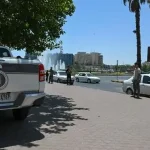
Tanvir’s lawsuit, which the Center for Constitutional Rights has taken on, is putting the FBI on the hotseat. “Mr. Tanvir has been prevented from flying despite the fact that he does not present any threat to aviation security,” the CCR suit reads, according to the Courthouse News Service. “Instead, defendants sought to exploit the draconian burden posed by the No Fly List – including the inability to travel for work, or to visit family overseas – in order to coerce him into serving the FBI as a spy with American Muslim communities and places of worship.”
The no-fly list, instituted after September 11, arbitrarily puts thousands of people on a list that prevents them from traveling. Tanvir is not the only one to have been pressured by the FBI.
A separate American Civil Liberties Union suit filed in 2010 represents other Muslims trying to get their names off the no-fly list. One of them is Nagib Ali Ghaleb, a Yemeni-American. In 2010, Ghaleb flew to Yemen to see his family and meet with U.S. consular officials about delayed visa applications for his wife and children. But on his way back, while awaiting to board a plane in Germany, an FBI agent questioned him. According to a recent ACLU report, Ghaleb “was directed to submit to an interview with FBI agents, who questioned him about his mosque and the San Francisco Yemeni community. The FBI agents asked him to become an informant for the FBI in California, but Mr. Ghaleb said he did not know any dangerous people and would not spy on innocent people in mosques.” Ghaleb remains on the no-fly list.
The practice of pressuring Muslims to become informants in their own communities in exchange for law enforcement help is one clear example of an apparatus running roughshod over the rights of Muslims in the U.S. It’s also a practice familiar to Muslims in New York City, who have to deal with a police department that has implemented a surveillance dragnet with the help of Central Intelligence Agency officials.
After 9/11, CIA officials strategized with the New York Police Department on how best to collect intelligence to prevent the next terrorist attack. The NYPD’s Intelligence Division ended up creating an operation where informants and undercover agents infiltrate mosques and student groups. The NYPD has labeled at least a dozen mosques as “terrorism enterprises” in order to infiltrate them. And in order to employ informants able to infiltrate Muslim communities, they usually strike a deal with people in trouble with the law. In exchange for spying on their community, the informant gets help from the NYPD in avoiding punishment for crimes.








